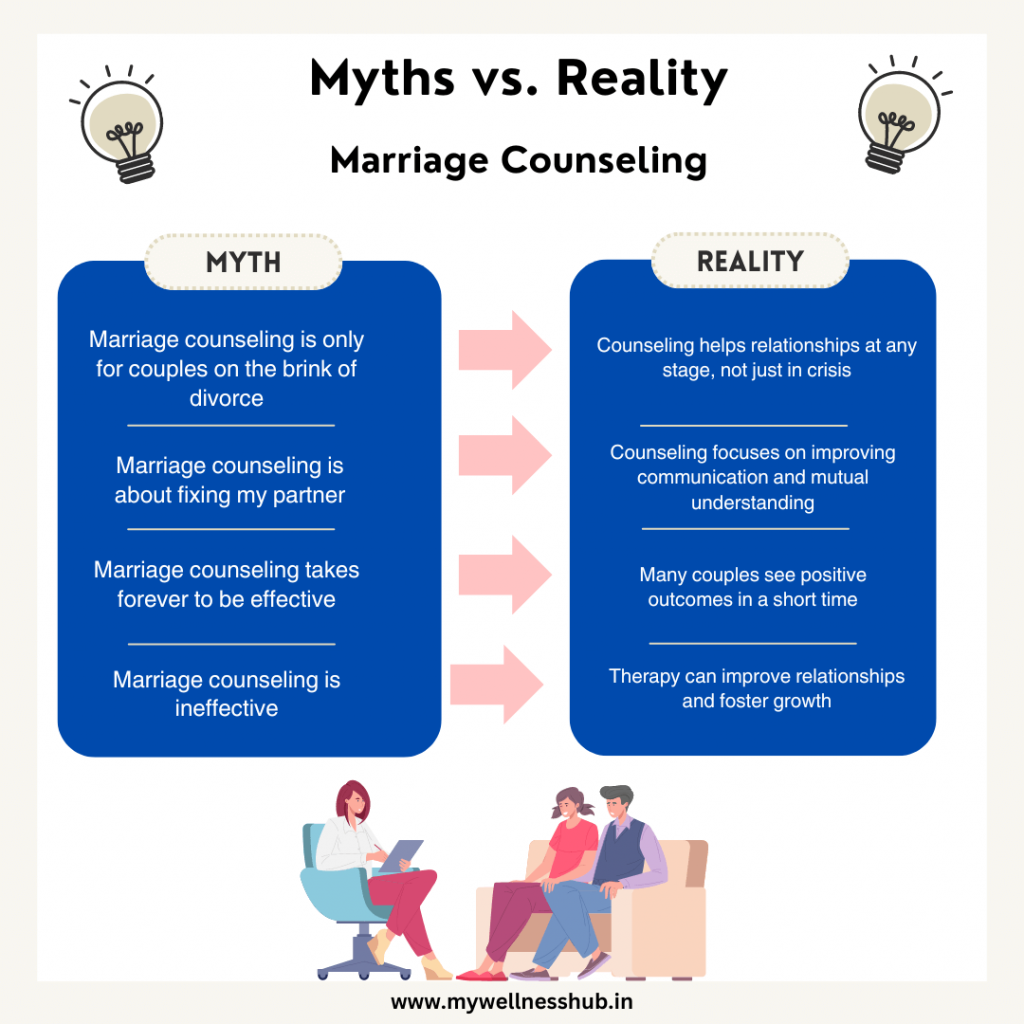Marriage Counseling Misconceptions You Need to Know
By Prapoorna M
Last Updated: June 1, 2024
Marriage is a sacred bond, a union of hearts and minds, yet it’s not immune to challenges. When couples encounter difficulties, seeking help through marriage counseling can be a crucial step toward resolution and growth. However, amidst the wealth of benefits that counseling offers, there are pervasive misconceptions that often deter individuals from seeking this form of support.
Picture this: a couple sits at a crossroads in their relationship, hesitant to embark on the journey of counseling due to ingrained beliefs that therapy is only for the deeply troubled or on the brink of divorce. These misconceptions, though widespread, are far from the truth. At Wellness Hub, we recognize the importance of debunking these myths to foster a healthier understanding of relationships and empower individuals to seek the support they need.
Dispelling Common Misconceptions

Myths vs. Reality
Marriage counseling is often shrouded in misconceptions, perpetuating false beliefs that hinder individuals from seeking the support they need. One prevalent myth is the notion that counseling is solely reserved for couples teetering on the edge of divorce. This misconception paints therapy as a last resort rather than a proactive tool for nurturing healthy relationships.
Example: Imagine Ram and Seeta, a couple in their thirties, facing communication issues and growing apart due to their demanding careers. Despite recognizing the need for intervention, they hesitate to pursue counseling, fearing judgment and the stigma associated with seeking help. This reluctance stems from the widespread misconception that therapy is only for couples in dire straits, reinforcing their apprehensions about reaching out for support.
Negative Impact: Such misconceptions perpetuate a sense of shame and inadequacy, deterring individuals from seeking timely intervention. By relegating counseling to a remedy for broken relationships, these myths obscure the broader benefits of therapy in fostering communication, resilience, and personal growth within partnerships.
Marriage Counseling Myths
Breaking the Stereotypes
Contrary to popular belief, counseling is not exclusively reserved for couples facing irreparable rifts in their relationship. Therapy transcends crisis intervention, offering a supportive framework for couples at any stage of their journey. Whether navigating minor conflicts or grappling with profound challenges, therapy provides a safe space for couples to explore, communicate, and grow together.
Example: Consider Krishna and Geeta, a newlywed couple experiencing a strain in their marriage due to conflicting career aspirations. Despite their love for each other, they find themselves at a crossroads, unsure of how to reconcile their individual goals with their shared future. Seeking guidance from a counselor, they discover new avenues for compromise, communication, and mutual support, revitalizing their bond and strengthening their partnership.
Common Marriage Counseling Misconceptions and the Truth
| Misconception | Truth |
|---|---|
| Counseling is only for couples heading to divorce. | Counseling is beneficial for relationships at any stage. It’s not just for couples in crisis but also for those who want to strengthen their bond. |
| Therapy is about fixing my partner. | Therapy focuses on mutual understanding and communication. It’s about improving the relationship, not changing or fixing one person. |
| Counseling takes a long time to be effective. | Short-term therapy can yield positive outcomes. Many couples see improvements in a few sessions or months, not necessarily years. |
| Therapy is only for marriages and families. | Therapy benefits all types of relationships, including unmarried couples, friendships, and other partnerships. |
| Therapy assigns fault and blame. | Therapy fosters mutual growth and understanding. It’s not about placing blame but about exploring each person’s role in the relationship. |
Also Read: Rekindle Your Marriage: 8 Steps to Save Your Relationship
Challenging Misconceptions with Facts
Debunking the “Fixing Partner” Myth
In the realm of couples therapy, a pervasive myth suggests that counseling aims to change or “fix” one’s partner. However, this notion fails to capture the essence of therapy, which centers on fostering open communication, empathy, and understanding within the relationship. Rather than focusing on altering individual behaviors, therapists guide couples toward healthier interactions and mutual growth.
Role of Therapists: Therapists serve as impartial facilitators, creating a safe space for couples to express their thoughts, emotions, and concerns without fear of judgment. Through structured sessions and evidence-based techniques, therapists equip couples with the tools to navigate conflicts constructively and cultivate deeper connections. By fostering healthy discussions and encouraging mutual respect, therapists empower couples to co-create solutions and embark on a journey of shared growth.
The Truth About Therapy Duration
Another prevalent misconception surrounding marriage counseling is the belief that therapy is a lengthy, time-consuming process. However, contrary to this assumption, therapy can yield significant benefits in a relatively short timeframe. Research indicates that many couples experience positive outcomes within a matter of weeks or months rather than years.
Efficiency of Short-Term Therapy: Studies have shown that focused, short-term interventions can effectively address specific relationship challenges and improve overall satisfaction. By targeting key areas of concern and implementing tailored strategies, therapists can help couples achieve tangible progress in a condensed timeframe. Whether resolving conflicts, enhancing communication, or strengthening intimacy, therapy offers a pathway toward lasting change and relationship fulfillment.
Know more: Save Your Marriage: Is Marriage Counseling Right for You?
Addressing Concerns and Providing Guidance
Understanding Therapy’s Impact
Amidst the myriad of doubts surrounding marriage counseling, one burning question often lingers: Is therapy truly effective or merely a myth propagated by hopeful couples? Let’s unravel this skepticism and shed light on the transformative power of counseling in strengthening relationships.
Responding to Doubts: It’s natural to harbor reservations about the efficacy of therapy, especially amidst prevailing misconceptions. However, research and real-life experiences affirm the profound impact of marriage counseling in fostering healthier, more fulfilling relationships. By providing a structured framework for communication, conflict resolution, and personal growth, therapy equips couples with the tools to navigate challenges and cultivate lasting intimacy.
Positive Outcomes of Therapy: Countless couples have experienced tangible improvements in their relationships as a result of therapy. From enhanced communication skills to deeper emotional connection, the benefits of counseling extend far beyond resolving immediate conflicts. By addressing underlying issues and fostering mutual understanding, therapy lays the groundwork for sustainable relationship growth and resilience.
Explore more on our article 10 Powerful Couples Therapy Tips to Rekindle Your Love
At WellnessHub, we understand the importance of holistic well-being in nurturing thriving relationships. As you embark on your journey towards couples therapy, consider integrating wellness practices into your daily routine. From mindfulness exercises to self-care rituals, prioritizing your mental and emotional health can complement the insights gained from therapy, fostering a harmonious balance in your relationship.
Conclusion
In our journey through this article, we’ve learned about the real facts behind marriage counseling. We’ve seen how common misunderstandings can make people hesitant to seek help. But now, armed with knowledge, it’s time to break free from these myths and embrace the positive impact therapy can have on our relationships.
Marriage counseling isn’t just for couples in crisis. It’s a tool for anyone looking to strengthen their bond. By understanding that therapy isn’t about fixing someone or assigning blame, we can approach it with an open heart. So, let’s take that courageous step forward and explore the possibilities of growth and connection. And remember, WellnessHub is here to guide you on your journey to healthier, happier relationships.
Frequently Asked Questions:
1. Is marriage counseling only for couples heading towards divorce?
No, that’s a common misconception. Marriage counseling is beneficial for couples at any stage of their relationship, whether they are facing serious issues or simply want to enhance their connection and communication skills.
2. Will the therapist take my partner’s side during counseling?
No, a therapist’s role is to be an impartial facilitator. Their job is to help both partners understand each other’s perspectives and improve communication, not to take sides.
3. Can marriage counseling fix my partner?
Marriage counseling is not about fixing a partner but rather about improving communication and understanding between both partners. The goal is to foster mutual growth and strengthen the relationship.
4. Does marriage counseling take a long time?
Not necessarily. While the duration of therapy varies, many couples benefit from short-term counseling focused on addressing specific issues and building relationship skills.
5. Is marriage counseling effective or just a myth?
Marriage counseling is effective for many couples. It provides a supportive space to address issues, improve communication, and build a stronger relationship. However, the effectiveness depends on the willingness of both partners to engage in the process.
6. Can marriage counseling help with a breakup?
Yes, marriage counseling can help couples navigate the end of a relationship in a healthy way. It can provide closure, assist with co-parenting discussions, and help both individuals move forward positively.
7. How Can I Suggest Marriage Counseling to My Partner?
Suggesting marriage counseling can be delicate. It’s important to approach the topic with empathy and understanding, framing it as a positive step towards improving the relationship rather than placing blame. Open communication and expressing a genuine desire to grow together can help make the suggestion more acceptable.
8. What If My Partner Refuses to Go to Marriage Counseling?
If your partner is hesitant or refuses to attend marriage counseling, it’s crucial to respect their feelings and avoid pressuring them. You can express your concerns and suggest alternative approaches, such as individual therapy or relationship workshops. Sometimes, taking the first step yourself can inspire your partner to join later.
9. What Should I Expect in a Marriage Counseling Session?
In a marriage counseling session, you can expect to discuss your relationship issues openly in a safe and supportive environment. The therapist will guide you through conversations, helping you and your partner communicate effectively, understand each other’s perspectives, and develop strategies for resolving conflicts.
10. How Can Marriage Counseling Improve Communication in a Relationship?
Marriage counseling can improve communication by providing couples with tools and techniques for effective dialogue. Therapists teach skills such as active listening, clear expression of needs and feelings, and conflict resolution strategies, all of which enhance understanding and foster healthier communication patterns in the relationship.
About the Author:
Prapoorna Mangalampalli
M.Sc., M.A., (Dual Masters in Psychology & English) – Counselor (6+ years of experience)
Prapoorna armed with a passionate dedication fueled by dual Master’s degrees in Psychology and English, Prapoorna sheds light on and elevates human experiences. Over 6+ years of experience fuel her insightful approach to counseling, offering profound empathy and guidance across diverse areas like online, marital, relationship, child, family, and career counseling.
At Wellness Hub, she thrives in a team environment that values innovation, compassion, and achieving results for their clients.
Connect with Prapoorna to learn how she can help you or your loved one find their voice and build a brighter future.
Book your Free Consultation Today
Parent/Caregiver Info:
Client’s Details:
* Error Message









